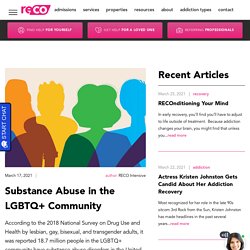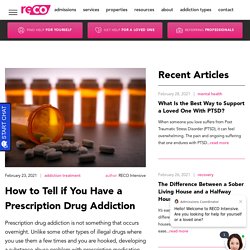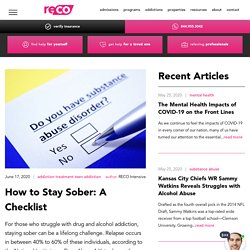

RECO Intensive
| RECO Intensive is a leader in the South Florida addiction treatment field, with proven success in facilitating long-term sobriety. Our program provides highly specialized solutions for those seeking recovery from addiction.
Substance Abuse in the LGBTQ+ Community. Substance Abuse in the LGBTQ+ Community According to the 2018 National Survey on Drug Use and Health by lesbian, gay, bisexual, and transgender adults, it was reported 18.7 million people in the LGBTQ+ community have substance abuse disorders in the United States.

The same study also reported that: Individuals who identify as bisexual are three times more likely to abuse drugs and alcohol.Questioning individuals and those who are struggling with their sexual identities are five times more likely to develop substance abuse problems.Individuals who identify as lesbian or gay are two times more likely to face addiction problems compared to individuals who identify as heterosexual.1 The LGBTQ+ community is lesbian, gay, bisexual, transgender, or questioning individuals, as well as others that do not feel like they fit with the traditional views of being heterosexual. As such, LGBTQ individuals typically face greater challenges when attempting to fit in with others and feel normal. How to Tell if You Have a Prescription Drug Addiction. How to Tell if You Have a Prescription Drug Addiction Prescription drug addiction is not something that occurs overnight.

Unlike some other types of illegal drugs where you use them a few times and you are hooked, developing a substance abuse problem with prescription medication takes time. Substance Abuse and Addiction Statistics in the United States. Substance Abuse and Addiction Statistics in the United States Every year, the Substance Abuse and Mental Health Services sponsors the National Survey on Drug Use and Health (NSDUH).

This annual report is used by various government agencies, addiction treatment centers, healthcare providers, and others to obtain the most accurate statistics on drug and alcohol use in the United States. The report also provides data on tobacco usage. Based on data from the 2018 NSDUH report and the 2019 NSDUH report, drug and alcohol abuse rates have increased.1,2 The increase is in part due to the legalization of marijuana in several states for medicinal and recreational purposes.
Drinking and Alcohol Use in the Military. Drinking and Alcohol Use in the Military Drinking and alcohol use in the military are nothing new.

Drinking has been part of being in the military for decades. The stresses of combat, being away from friends and family, and other challenges can often lead to young military personnel looking for a way to destress, unwind, and find relief. Sadly, this is often in the form of alcohol. How Addiction Affects Families: The Impacts of Substance Abuse.
How Addiction Affects Families: The Impacts of Substance Abuse When a family member suffers from an addiction to drugs or alcohol, it can have an impact on the entire family.

Quite often, the addict feels like their addiction problem is theirs alone. They are not able to comprehend how their addiction is affecting their family. The stress and strain the addiction places on the family can lead to arguments, trust issues, conflict, aggression, angry, a breakdown of communications, and resentment.
Fear and Addiction Recovery: What to Expect and How to Cope. Fear and Addiction Recovery: What to Expect and How to Cope Overcoming fear can be rather challenging for people with substance abuse problems.

Fear becomes a common theme for people with addictions. They are afraid of losing their jobs. They are afraid of people finding out about their addiction. They are afraid of getting caught using. They are afraid of losing custody of their children. Mental Health and Addiction: What Is the Relationship Between the Two? Mental Health and Addiction: What Is the Relationship Between the Two?

When a person has mental health issues, it is not that uncommon for them to also develop an addiction to one or more substances. Substance abuse is often the result of self-medication to deal with mental illness through drugs and alcohol. In some cases, the person develops an addiction first, and then the mental health issue because of the addiction. For example, alcohol is a natural depressant. As such, alcohol addiction could eventually cause the person to feel depressed and pave the way to depression. How Do Drugs and Alcohol Affect the Immune System? How Do Drugs and Alcohol Affect the Immune System?

Immunity is the body’s ability to fight off disease and infection. As we have seen with the COVID-19 pandemic, many people’s immune systems have not been effective at fighting off this virus. Many people have died due to their compromised immune systems and other “at-risk” factors. The immune system is able to tell the difference between healthy cells and invaders that make cells “sick.” The immune system also can determine when there are various warning indicators that an invasion is beginning.
If the immune system is able to respond fast enough, it can fight off infections, diseases, and illnesses before they become too serious. Additionally, once the threat has been eliminated, the immune system will begin to return to normal functioning. Coping with Anxiety, Depression, and Addiction for Recovering Addicts During COVID-19. Coping with Anxiety, Depression, and Addiction for Recovering Addicts During COVID-19 Dealing with the COVID-19 crisis can be very stressful and make us feel anxious about the unknowns.

We know there is no cure for the virus presently and it may be years before a vaccine is available. We also know there is not a viable treatment currently available. With states shutting down, reopening, and closing things back up, along with changes to our regular normal routines, it is easy to see why people are anxious and stressed. In some places, the information we are receiving is contradictory, with one agency saying one thing and another saying something completely different. How to Stay Sober: A Checklist.
How to Stay Sober: A Checklist For those who struggle with drug and alcohol addiction, staying sober can be a lifelong challenge.

Relapse occurs in between 40% to 60% of these individuals, according to the National Institute on Drug Abuse.1 Yet relapse, the inability to remain sober over time, can be prevented. Addiction recovery extends well beyond initial treatment for someone with a substance use disorder (SUD); at addiction treatment centers such as RECO Intensive in Delray Beach, FL, we help with various addictions at all stages of recovery. The potential signs of relapse include increased stress levels, denial, changes in attitude, highlighting the good times of past substance use, isolating oneself from one’s support system, or negating the risk of using again.
Recognizing these can be the path to staying sober. Identify People, Situations, and Other Triggers. The 8 Stages of Alcoholism from Occasional Use to Alcohol Addiction Treatment. The 8 Stages of Alcoholism from Occasional Use to Alcohol Addiction Treatment No one becomes an alcoholic overnight. The path to alcohol addiction treatment typically starts with younger adults, even teenagers, who are experimenting with alcohol for the first time. They might try beer, wine, and the “hard stuff” to find out what it tastes like and how it affects them. Some people decide early on that drinking alcohol is not for them. Others, however, like how alcohol makes them feel. Eventually, this early experimentation can lead to the different stages of alcoholism. Can Prescription Drug Treatment for Chronic Pain Become an Addiction? Can Prescription Drugs Become Addicting For Chronic Pain?
When you suffer from chronic pain, it can be difficult to perform daily activities and routines. From taking care of children and working to spending time doing things you enjoy, chronic pain can make it difficult and even impossible to do these things. One way people address their chronic pain is with prescription drug treatment. There are all sorts of prescription drugs that help chronic pain. When is it Time for an Intervention? When is it Time for an Intervention? When someone you care about is struggling with addiction, sometimes gentle support and suggestions are not enough to open their eyes to the effects substance use is having on their lives. Leading someone to the addiction recovery they desperately need sometimes requires a unified approach like an intervention. Addiction Treatment For Seniors/Older Adults.
Addiction Treatment For Seniors/Older Adults Older adults often suffer from addiction, but the signs of substance use or alcoholism may be unnoticed. Even when the warning signs are recognized, the available addiction recovery programs may not be effective. The reasons that seniors become addicted to drugs or alcohol are complex and need to be addressed in outpatient addiction treatment programs that serve the needs of these unique individuals.
Because the aging process can mimic the symptoms of drug or alcohol misuse, and the perceived social stigma among an older peer group, many elder Americans do not check themselves into addiction treatment centers. However, there are outpatient programs tailored to you or your loved one that address all aspects of the disease. 8 Addiction Recovery Tips for Moms. 8 Addiction Recovery Tips for Moms Mothers are under a tremendous amount of stress in modern society, and a cultural acceptance of drinking and prescription drug use is widespread, leaving many moms struggling to meet impossibly high standards with substance use as the norm. Addiction in the LGBTQ Community. The Connection Between Smoking Cigarettes and Substance Abuse. A Guide to Finding New Hobbies During Recovery.
What Does It Mean to Take a Mental Health Day? How to Rebuild Your Financial Stability After Recovery. How to Stay Sober Through Medical Treatment. Low Self-Esteem and Drug Addiction. Drug and Alcohol Addiction: How It Affects Your Loved Ones. How Drug & Alcohol Addiction Affects Your Loved Ones. What Are Depressants and How Are They Abused? Is Alcohol the Cause of College Depression? College depression is a very common condition. Binge Drinking & How It Affects Your Body. For many, especially young adults, nights filled with beer and shots of liquor are extremely common. Heavy drinking is often seen as a “coming of age” activity, and the effects of drinking seem minuscule compared to the fun and rambunctious times. What many don’t realize is that excessive heavy drinking leads to much more than hangovers, headaches, and upset stomachs.
A 2015 study conducted by the Centers for Disease Control & Prevention determined that 1 in 6 U.S. adults reported binge drinking at least four times a month. Though many believe that long-term damage from excessive alcohol use is limited to alcoholics, frequent binge drinking can cause serious health issues. Can Someone With Alcohol Addiction Still Drink in Moderation? Pregnancy and Opioid Addiction: There IS Hope. The Five Most Commonly Abused Over-the-Counter Substances. Nutrition and Healing the Body in Recovery: How Healthy Eating Can Support Sobriety.
Dealing with Trauma Issues to Strengthen Recovery. Understanding Co-Occurring Addiction and Mental Illness. Transitioning from Inpatient to Outpatient Rehab: Pitfalls & Best Practices. Steps to Entering the Workforce After IOP. Returning to a Place of Strength: 3 Reasons to Go Back to Treatment. Navigating a Sober Dating Life.
How to Cope with Anxiety and Depression without Drugs. Intensive Outpatient Treatment (IOP) in Boca Raton. Alcohol and Drug Abuse on Campus: How to Prevent Addiction Among College Students. The 10 Most Dangerous and Most Addictive Substances. Healthy Mothers, Healthy Babies: Conquering Addiction in Pregnant Women. Driving Under the Influence: Exercise Choice and Save Lives. A Quiet Pain: Substance Abuse Among Veterans. When a Loved One Has an Addiction: Practical Steps. Knowing When to Seek Help for Addiction: A Guide for Teens and Adults. Five Signs It’s Time to Get Addiction Help. The Road to Sobriety: Inpatient Versus Outpatient Treatment.